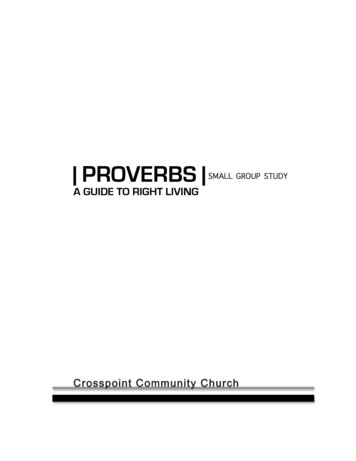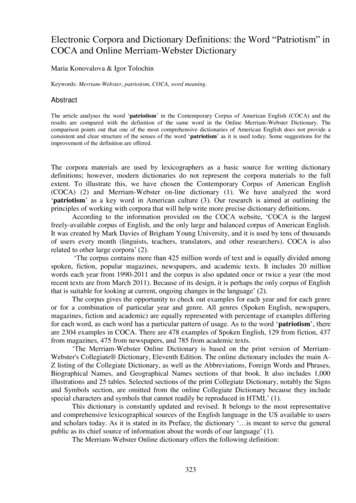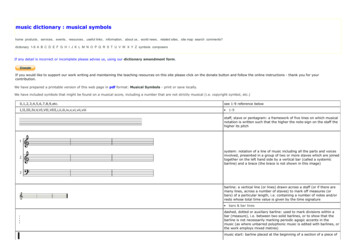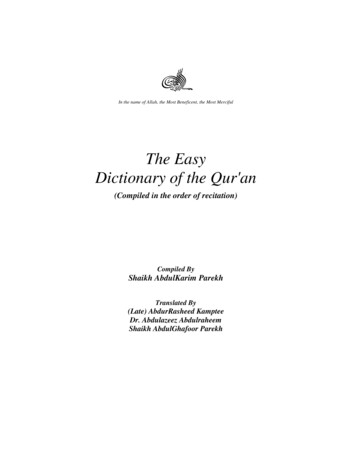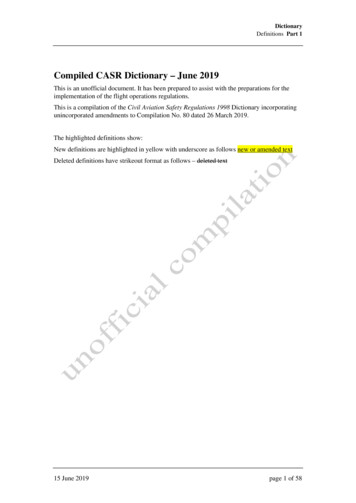
Transcription
ADictionaryOfKashmiriProverbsOmkar N. KoulIndian Institute of Language Studies
2A DICTIONARY OF KASHMIRI PROVERBSA Dictionary of Kashmiri ProverbsbyOmkar N. KoulC-13, Greenview ApartmentsPlot No. 33, Sector 9, Rohini,Dehli - 110085onkoul@sify.comFirst Edition 1992Second Edition 2005 The AuthorPublished by:Indian Institute of Language StudiesDelhiwww.iils.orgISBN 81-86323-21-X
A DICTIONARY OF KASHMIRI PROVERBS3PrefaceFor the purpose of this dictionary, a proverb is defined as astatement that may contain an advice, a warning, aprediction or simply an observation. Idiomatic expressionsand similies which are the part of the language are notincluded in this dictionary.Proverbs are of different types. Some proverbs aresimple folk sayings (for example, p tshis potsh khara:n‘One guest does not like the other’). Such proverbs havetheir literary meaning quite prominent. Some proverbs arephilosophical which aspire to deal with great mysteries andcomplexities of life (for example, bech nas n mandchun tbast khakhra:yi k’a:? ‘One who is not ashamed ofbegging, why should he be ashamed of the sound of hisbegging bag?’). Others are metaphorical in which the literalmeaning is merely redundant (for example, g :v n’a:ybo:za:n s :ri:, da:d n’a:y n ka:h ‘Everyone listens to thedispute of the cow and no one listens to the dispute of thebull.’ This means that women earn sympathy more readilythan men). In this dictionary, all the three types of proverbsare listed.A large number of proverbs listed in this collectionhave been handed down orally from generation togeneration. Slight variations in their wordings areinevitable. Such proverbs have been listed in their mostfamiliar form. Some common variants are also mentioned.The origins of the proverbs are obscure in most of thecases. Some of these are directly related to certainreligious, cultural, historical and literary texts. A largenumber of them are quotes taken from the literary(especially poetic) compositions of famous saint poets like
4A DICTIONARY OF KASHMIRI PROVERBSLalleshwari and Sheikh Noor-ul-Din. They have becomepart of the folk wisdom. A number of proverbs areborrowed from Sanskrit and Perso-Arabic sources. Thesources of proverbs have not been indicated.A wide range of beliefs prevail regarding the wisdom ofproverbs. Most common beliefs are as follows:A good proverb is never out of season.Hold fast to the words of ancestors.Proverbs are the condensed good sense ofnations.Wise men make proverbs and fools repeatthem.A proverb is the wit of one and the wisdomof many.Time passes away but sayings remain.Proverbs are like butterflies, some arecaught others fly away.Proverbs in a language do reflect the socio-culturalmilieu and wide range of experience of the people who usethem in a particular society. They do not have to be alwaystrue. Folk wisdom is sometimes contradictory. Forexample, the following two proverbs regarding a couple ortwo friends are contradictory:1. halen ba:nan vuk r’ tha:n, hivis hiviysamkha:n‘The twisted pots have twisted lids.’One meets the people of his/her owninterests.(‘Birds of the same feather flock together.’)2. naras khar t kharas narA human being gets a donkey (as acompanion) and a donkey gets a human
A DICTIONARY OF KASHMIRI PROVERBS5being. ( ‘One gets a partner just opposite tohis/her expectations.’)Proverbs may or may not be regarded as a source ofaccumulated wisdom. They are seen as a collection of tagsthat enable thoughts to be communicated and exchanged.Proverbs in any language have their own characteristicsand style. They are short memorable statements. It is said,‘A proverb is shorter than a bird’s beak.’ Proverbs aregenerally used and quoted extensively in conversations andliterary texts.Proverbs in Kashmiri are of different styles. Prominenttypes are as follows:1. A simple statementtsu:this vuchith tsu:th rang rata:n‘An apple gets its colour from another apple.’2. Conjoined phrasesa:yi v :nis t g yi ka:dris‘(She) came to visit the shopkeeper but went tovisit a baker instead’.3. Question-answer style“m :j, vohava:n chumn ka:h.”“potr vati peth beh.”‘Mother, no one abuses me.’‘Son, go and sit on the road.’Besides the use of terms of address, the question-answerstyle is also used with the help of a narrator. Consider theconversation between a mother-in-law and daughter-in-law:noshey kuth khas, dopnas a:m ts k’a: karni chas.‘(My) daughter-in-law, go to your bedroom.’ (She)
6A DICTIONARY OF KASHMIRI PROVERBSreplied, ‘What else I have come here for?’Here the term dopnas ‘she/he told her/him’ is used toindicate addressee and addresser.Proverbs have been collected from both primary andsecondary sources. A large number of proverbs have beencollected from the people who use them natively in day-today conversations. Detailed notes were maintained of suchproverbs. Among the secondary sources some earliercollections, Kashmiri language dictionaries and varioustexts have been consulted. It is important to mention herethat A dictionary of Kashmiri proverbs and sayings by Rev.J. Hinton Knowles (1885 Indian reprint 1985) is the firstattempt in compiling the proverbs and sayings in Kashmiri.A large number of proverbs listed in the above dictionaryare either obsolete or merely translations of the Persianproverbs. The obsolete proverbs and those which aremerely literal translations of Persian proverbs have notbeen listed in the present work. Among the native scholars,Ghulam Nabi Nazir has compiled a collection of Kashmiriproverbs entitled k :shir’ d p t’ (Kashmiri sayings,1988)with their meanings in Kashmiri. This caters to the interestof native speakers of Kashmiri only who can read and writeKashmiri. The above two prominent works are usefulreference materials on proverbs and sayings. Omkar Koulhas edited k :shir’ d p t’ dikshanri: (A dictionary ofKashmiri Proverbs, 2000) which provides explanation ofKashmiri proverbs in Kashmiri. In the present volume, alarge number of proverbs have been collected from variousliterary texts and dictionaries.Proverbs are listed in the alphabetical order used in thelinguistic texts in Kashmiri beginning with vowels andfollowed by consonants. The usual order is as follows: , :,, :, a, a:, i, i:, e, e:, u, u:, o, o:, , k, kh, g, c, ch, j, ts, tsh, t,th, d, t, th, d, n, p, ph, b, m, y, r, l, v, š, s, z, h. Forunderstanding the transcription of the proverbs it is
A DICTIONARY OF KASHMIRI PROVERBS7important to mention the phonetic values of these signs.Speech sounds in Kashmiri are presented below:VowelsFronti, i:e, e:HighMidLowConsonantsStopsBil.Central, :, :a, a:Backu, u:o, o:Den. Alv. Ret.Pal. Vel.Glo.Vl.Unasp.pttkAsp.phththkhVd.Unasp. smnFricativesVl.sšhVd.zLaterallTrillrSemivowels vyThe nasalisation of vowels is indicated by the nasal sign/ / above the concerned vowels. The colon sigh /:/ after thevowels indicates the length of the vowels. Thepalatalization of consonants is indicated by the sign ofapostrophe /’/ after the concerned consonant. Abbreviationsused above are: Vl. (Voiceless), Vd. (Voiced), unasp.(Unaspirated), Asp. (Aspirated), Bil. (Bilabial), Den.(Dental), Alv. (Alveolar), Ret. (Retroflex), Pal.(Palatal),Vel. (Velar), Glo. (Glottal).Kashmiri proverbs in Devanagari and Romantranscription are immediately followed by literal
8A DICTIONARY OF KASHMIRI PROVERBStranslations. Literal translations present simple renderingsof the Kashmiri proverbs in English and are not merelyword-for-word translations. Sometimes literal translationsmake the meanings clear. Whenever necessary, theirmetaphorical (hidden or extended idiomatic meanings) areexplained. Whenever possible, an attempt has been made toprovide English equivalents or near equivalents after theirliteral translations or simple explanations. It is to be notedthat the translations do not claim to be equal in style.Translating Kashmiri proverbs into English has been adifficult job. I am grateful to my friend Mr. R.K. Bharatifor going through an earlier draft of the manuscript and foroffering constructive suggestions for its improvement. Iwould also like to thank Prof. Peter Edwin Hook, Prof.Anjani K. Sinha, Dr. Dick Smith and Dr. H. Kumar Kaulfor going through parts of the manuscript and for offeringtheir suggestions.The first edition of this dictionary was first published in1992 which is out of print now. Mr Sunil Fotedarvolunteered to put selected proverbs from this dictionary onthe web. This generated a lot of interest among scholarsand general readers. I would like to thank Mr Fotedar forencouraging me to bring out the second edition of it.I am grateful to Mr. M. K. Raina for transcribing theoriginal Kashmiri proverbs from Roman into theDevanagari script. It can be used by those who are familiarwith the Devanagari script.I would be happy to receive comments from the readerswhich would help me to revise it.Omkar N KoulSeptember 15, 2004.
A DICTIONARY OF KASHMIRI PROVERBS9k’ ts t sum t sa:s gov k li.One man cut the bund/barrage, and a thousand people fellinto the river.k’ tshõ:d duniya: t beyi k’ yi:ma:n;duniya: t yi:ma:n chin d n vay athi yiva:n.One man sought the world, and another sought for faith.The world and faith both do not go hand in hand.!"#! k’sund k siya:n beyi sund g za:One person’s vomit is another’s food.Someone lives on the leftovers of others.! #! k’ sund daza:n a:b, t beyi sund n doza:n ti:lOne man can burn water, whereas another cannot even burnoil. A matter of luck." %&'kis daza:n d :r t b’a:kh chus vuš na:va:n athOne man’s beard is on fire, and another man warms hishands on it. To take advantage of someone’s misery." "ch k :n’ ja:n t vath k :n’ nIt is better that the eye be blind than that the way is blind.
10A DICTIONARY OF KASHMIRI PROVERBS() %ch peth n m ch z rv n’Not to bear a fly on someone’s eye.To take good care of someone.'%ch vatsh t ga:š rusMay your eyes be opened but see nothing. (A curse)To turn a blind eye to something.*!("ch hund m niphol a:sunTo be the pupil of one’s eye. To be liked or loved a lot.To be an apple of someone’s eye.( (%chan paci ph’ur gatshunTo turn one’s eyes away from someone.To forget someone’s help.% ,"- "charva:lav s :t’ k nd’ kad n’To remove thorns from someone with one’s eyelashes.To love someone deeply. To take good care of someone.,%% "chav ndr n’un s rm k dithTo take the antimony out of someone’s eyes without lettingher/him know. An act of a very cunning person.-.d’ d d’ yetshi t- .%d’ d d’ retshi
A DICTIONARY OF KASHMIRI PROVERBS11Half (the people) are burnt with their choice, and half areburnt by being driven into it (not out of choice).Half the people deserve their fate and the other half do not.- %- %d’ la:r t d’ da:r.Half at Lar and half at Dar. Unmanaged/scattered propertyor assets. Scattered relations./%d y um r t b d y bala:y.(Have) half a life and (live it in) great misery. A curse.:ti: d :d’ buchinay m’a:ni ch m v chinay.May diseases sting you right there, and 1 be unable to seeit. A curse.'**ti: ša:h t ti: gada:h.A king for a moment and a beggar soon after.One’s fortune can change very fast.&0th’ ba:nas kh’on t th’ ba:nas charunTo eat out of a vessel and then defile it.To receive someone’s hospitality and then slander him/her.% 12*d r z t h’uh aga:di gatshun.To stick (to something) like a wet cloth.To be veryadamant. To keep on insisting. To pester someone.
12A DICTIONARY OF KASHMIRI PROVERBS%",n’ chor lamas tal t k :si vuch n .A blind man sat down to shit on a slope, and thought thatnobody could see him.! &*n’ s nz k lay kh da:yas hava:l .A blind man’s wife is God’s keeping.## (nim s y, v v m s y, l jim s y pa:n s y.I brought the nettle, sowed the nettle, and then the nettlestung me. To be affected by one’s own deeds. Ingratitude. (""%3nis anigati d :ph k’a: kari?How will a lamp help a blind person in the dark? .A lamp is of no use to a blind man in the dark.'* #*nis muš ha:v n’, na chu g na:h na sava:bTo show one’s fist. to a blind man, is neither a sin nor avirtue. Advice is lost on stupid people.%***% # 4 "nis ra:th t d h hivi:Night and day are the same to the blind man."!*nis ha:va:n s :ri: vath be:klas n kã:h.
A DICTIONARY OF KASHMIRI PROVERBS13Everyone can show the way to a blind man, no body canshow the way to a stupid person. It is not possible to guidea stupid person., 5 , 5,% 4 67nd r’ nd r’ ts nd rgo:m (va:tun).To reach Tsandargam (Moon town) village inwardly.When a person is actually in great distress, but doesn’tshow it.,% *&% (ndr tshunihas th kh t nebr dopun gum a:yam.Inside, they spat on him. On coming out he said, “It isperspiration”. To hide one’s humiliation.,% (% 2&ndr daza:n pa:n t nebr daza:n lu:kh.One burns from within, and outwardly other people do so.A person may shiver in severe cold, but pretend as if hedoesn’t. To show off and make others envious.,% 8! "%ndraman grand kar n’To count (someone’s) intestines. To know all secrets.,% '* !%% '* %ndrim ša:h andar t nebrim ša:h nebar gatshun.Inner breath inside and outer breath outside: i.e. to haveone’s breath taken away (choked) by some astonishingevent.To be wonder struck. To be astonished.(' "&pis d n’ muškil khen’.
14A DICTIONARY OF KASHMIRI PROVERBSA loose-lipped person finds it hard to eat a morsel of meat(without bragging about it). A shallow person cannotconceal a secret advantage. Some people ruin an advantageby revealing it to everyone else.%" * -("%m’ ya:r balan chi k :t’a:h n t’ phut r :vim t’.Many a water pitcher has this bank of the river broken.A source of destruction. A hazard. A dangerous person.5%%"!*r’ a:yi s :ri: t or gav n kã:h.All people came (were born) in good health, but none left(died) healthy.% ( 9&ris pa:nas dr kh.Fall sick and be treated with leeches!Leaches on a healthy body! (A curse).("liph l :l van n’.To narrate the whole story (from the beginning to the end)of Alif Laila. To explain things in unnecessary detail.("()liph peth ye:yas ta:m.From the letter lif to ye (the first and the last letters
15.09.2004 · A DICTIONARY OF KASHMIRI PROVERBS 9 k’ tst sum t sa:s gov kli. One man cut the bund/barrage, and a thousand people fell into the river. ˇˆ ˆ k’ tshõ:d duniya: t beyi k’ yi:ma:n; duniya: t yi:ma:n chin dnvay athi yiva:n. One man sought the world, and another sought for faith.

